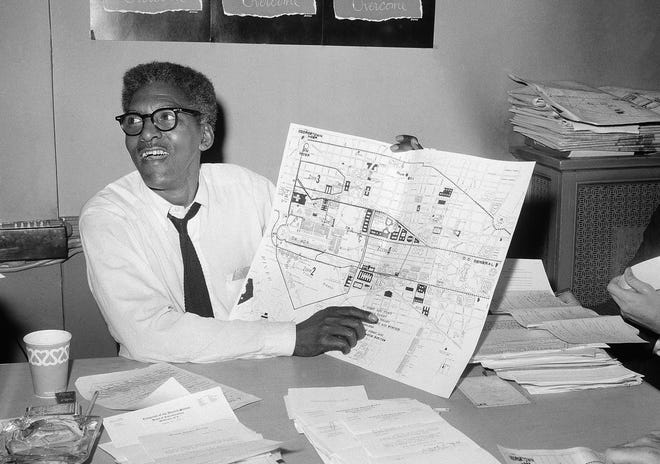NYACK – The small village street that’s now named “Bayard Rustin Way” was once home to rows of Black-owned homes before the road was truncated to make space for parking lots and high-rise affordable housing.
Next to that new street sign sits the Phyllis B. Frank Rockland County Pride Center, which bought a shuttered brick building that was once an Elks Lodge, a hub of that vibrant Black community.
The street’s location, in many ways, summed up the legacy of Rustin, a civil rights leader whose talents and contributions were often overlooked because he was an out gay man.
On Thursday night, the hundreds who gathered to cheer the street renaming learned about Rustin, and were urged to keep alive his legacy of speaking up and speaking out.
“If we are not good for all the people, we do not exist here,” Pride Center Executive Director Brooke Malloy told those gathered to witness the street naming and then walk down the block for the annual Black Pride Block Party at Hezekiah Easter Square in the heart of the village.
The street renaming and celebration was a collaboration among the Nyack NAACP, the Rockland County Pride Center, and the village of Nyack.
Bill Batson, a Nyack artist who grew up on Jackson Avenue, called the renaming a reclaiming.
Rustin had once lived in the Nyacks, when he was a leader in the Fellowship of Reconciliation, then housed in an old manse along the Upper Nyack riverfront.
And, Batson noted, the Black and LGBTQ community in Nyack had long stood in solidarity, with the colors of the Pride rainbow, trans and Pan-African painted along crosswalks downtown.
Malloy said that solidarity still needs to be loud and visible. “This is the worst year we have ever had for hate,” she said. With a crowd full of elected officials and dignitaries, she added, “stop politicizing our lives.”
NAACP President Nicole Hines echoed the concern for hate that has brewed in the nation and “right here in our country. Now more than ever we need our allies.”
That means speaking up and speaking out, Hines said. “Don’t just put it on Facebook. The Black LGBTQ+ community needs you. Please take some action.”
Bayard Rustin’s legacy
Rustin is considered one of the architects of the 1963 March on Washington For Jobs And Freedom, where the Rev. Dr. Martin Luther King Jr. gave his “I Have a Dream” speech that touched a nation.
But on that August day, he stayed in the background as Rustin’s sexuality had been used to pressure King to give up his plans for the march.

Racism in sports: Section 1 working on regional plans to respond to incidents
Pride Month 2022: Where to celebrate in the Hudson Valley
School elections: Fiery rhetoric against equity initiatives mostly fizzles at polls
It was not the first or last time Rustin’s leadership would be overshadowed by anti-gay pushback.
That included losing his role with FOR and his footing in Nyack. The pacifist organization, founded in 1915, is considered the oldest interfaith peace organization in the U.S. But it officially fired Rustin after a 1953 arrest in California on a morals charge.
FOR, now based in Stony Point, issued a statement Thursday night calling their treatment of Rustin “a grave mistake and great loss.” The organization in 2021 had issued a posthumous apology to Rustin.
California pardoned Rustin for that conviction in 2020.
Rustin’s Rockland ties are stronger still. He and former Pomona resident George Houser organized the Journey of Reconciliation in 1947, which became the model for the 1961 Freedom Rides. The effort, organized by the Congress of Racial Equality, or CORE, tested whether Jim Crow states were actually ending segregated transit.
On one of those original freedom rides, Rustin and others were arrested for disorderly conduct. They were sentenced to 30 days on a chain gang. Next week, 75 years after the incident, the Orange County Superior Court in Hillsborough plans to hold a formal hearing to vacate those sentences.
A Quaker and draft resister, Rustin is credited with ingraining Gandhi’s peaceful protest techniques into the American civil rights movement and employing resistance strategies that shaped Dr. Martin Luther King. Jr. into an international symbol of peace and nonviolence.
Rustin spoke out many times about the importance of his Black and gay identity. In 1986, he was working on behalf of what was then known as New York State’s Gay Rights Bill. He died in 1987.
Rustin was inducted into the Rockland County Civil Rights Hall of Fame in 2015 and bestowed a posthumous Presidential Medal of Freedom, the nation’s highest civilian honor, in 2013 by President Obama.
Phyllis B. Frank, who established the first Pride-oriented celebration to Rockland 24 years ago, said it was important to have a daily reminder of Rustin and other LGBTQ heroes so often lost to history.
“He always did it his way,” Frank said of Rustin, “out and proud.”

Pride Sunday
On June 12, Nyack hosts Rockland Pride Sunday. The free family-friendly event takes place downtown from noon-5 p.m. Concurrently, the Pride Center hosts Youth Pride Extravaganza.
Find out more at rocklandpridecenter.org/events/pride-sunday/.
Nancy Cutler writes about People & Policy. Click here for her latest stories. Follow her on Twitter at @nancyrockland.








